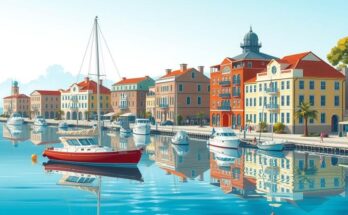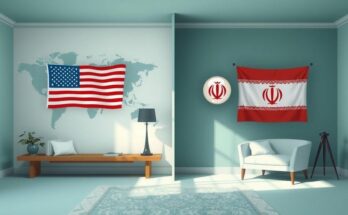Congo’s government reported that M23 rebels, backed by Rwanda, have seized Bukavu, the second major city in its eastern region. The rebels aim to restore order following significant unrest and incompletion by local authorities. With over 6 million displaced, the humanitarian crisis deepens as a call for ceasefire negotiations persists amidst a lack of decisive international action.
On Sunday, the Congolese government announced that Rwanda-backed M23 rebels have taken control of Bukavu, the second major city in eastern Congo, following their earlier capture of Goma. Reports indicate the rebels positioned themselves at the governor’s office and expressed their intent to “clean up” the disturbances caused by the previous regime. Observers reported that many residents cheered as the rebels entered Bukavu after a lengthy march, while government forces appeared to retreat rather than resist.
The M23 rebels, supported by an estimated 4,000 troops from Rwanda, are among over 100 armed groups competing for control over eastern Congo’s vast mineral resources. The ongoing violence has resulted in the displacement of more than six million people, marking it as the most significant humanitarian crisis in the world. A local resident expressed concern, questioning the government’s inaction amid the chaos.
Bernard Maheshe Byamungu, a leader of the M23 sanctioned for human rights violations, stated their goal was to restore order in Bukavu, which he claimed had devolved into a “jungle.” He faced a crowd urging the rebels to pursue the capital, Kinshasa. The M23 refrained from formally declaring the city’s capture to avoid international backlash, unlike their previous announcement regarding Goma.
The trajectory of the M23 suggests aspirations for political power rather than mere territorial conquest, diverging from prior activity in 2012. Analysts note connections between the current unrest and long-standing ethnic disputes. The M23 claims to protect ethnic Tutsis, while Rwanda asserts that Hutus, associated with the 1994 genocide, continue to persecute Tutsis in Congo.
Congo’s President Felix Tshisekedi has raised concerns about the potential for regional conflict escalation, asserting that his government maintains control over Bukavu. International forces are also present, with South African troops backing efforts in Goma and Burundian troops in Bukavu, although Burundi’s leadership signaled a reluctance to engage militarily. The ongoing unrest was a key subject during an African Union summit, with calls for ceasefire negotiations circulating.
Despite the crisis, the international response has been subdued, with leaders advocating dialogue over direct action against the M23 and its Rwandan affiliations. The Congo River Alliance, which includes the M23, pledged to defend Bukavu’s residents and urged them to maintain composure amid unrest.
In summary, the recent occupation of Bukavu by M23 rebels highlights a significant escalation in the ongoing conflict in eastern Congo, marked by inaction from government forces and increasing support for the rebels from local populations. With deep historical roots linked to ethnic tensions and the region’s mineral wealth, the situation raises international concerns about potential wider ramifications. Efforts for dialogue continue, yet the path to stability remains fraught with challenges.
Original Source: www.newspressnow.com




